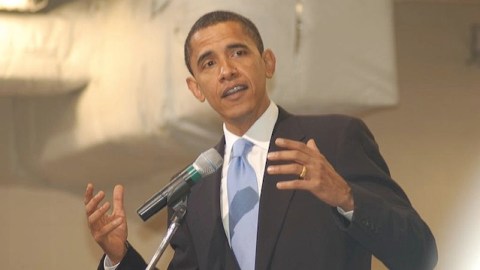Why the Tax Cut Deal Makes Sense for Democrats

There has been outrage from both sides of the aisle at the deal that Obama has worked out with the Republican leadership to extend the Bush tax cuts. Some Republicans complain that they should agree to extend unemployment benefits in exchange for tax cuts on income over $250,000. Many Democrats, meanwhile, are galled by the fact that Obama consented to tax cuts on income over $250,000—as well as a new low tax on very large estates—when polls show that the public is favors letting the tax cuts on high incomes expire as a way of reducing the deficit. Sen. Bernie Sanders (I-VT) held the floor for more than 8 hours to delay passage of the bill. “Republican colleagues want huge tax breaks for the richest people in this country, but the reality is that the top 1 percent already—today—owns more wealth than the bottom 90 percent,” Sanders said. “How much more do they want? When is enough enough? You want it all?”
Obama fired back in apparent frustration at critics in his own party, saying at a press conference that while he is as opposed to the high-end tax cuts now as he has been for years and promising to fight to end them in when they expire again in two years. But, he added,
the middle-class tax cuts were being held hostage to the high-end tax cuts. I think it’s tempting not to negotiate with hostage-takers, unless the hostage gets harmed. Then people will question the wisdom of that strategy. In this case, the hostage was the American people and I was not willing to see them get harmed.
Former president Bill Clinton rose to Obama’s defense, telling reporters,
Look, if we had 5 percent growth and unemployment was dropping like a rock, maybe you could have the so-called Mexican standoff and you could say: “It’ll be you, not me, the voters will hold responsible for raising taxes on middle-class people, if they all go down, you know, next year.” That is not the circumstance we face.
While Republicans expressed shock and outrage that Obama would compare their obstructionism to hostage-taking, the truth was Obama had a point: in fact his choice was probably between extending all the Bush tax cuts or none of them.
The fact is that the Democrats bargaining position was never as good as it might have seemed. Republicans knew that Democrats were split on whether they would prefer to extend the tax cuts on incomes over $250,000 or let all the tax cuts expire. Letting the tax cuts for most Americans expire while the economy is so bad would have been politically difficult for the Democrats. And the Democrats’ numbers in Congress are only going to go down in January. So in exchange for their cooperation, Republicans were able extract the only thing Republicans seem to care about these days: the extension of the tax cuts on high incomes.
But as part of the deal the Democrats were also able to get the extension of unemployment benefits, a cut in the payroll tax, and an expansion of of the earned income tax credit—all of which amounts, as David Leonhardt says, to a second stimulus package. In spite of the practically unprecedented tax breaks for the rich, as Steve Benen points out, the bill mostly benefits progressive causes. Charles Krauthammer agrees, saying Republicans got swindled. And a second stimulus, as I have argued, is precisely what Obama needs to ease the pain of the faltering economy, not to mention precisely what he needs to have much chance of winning a second term.





